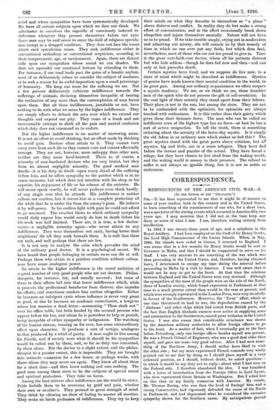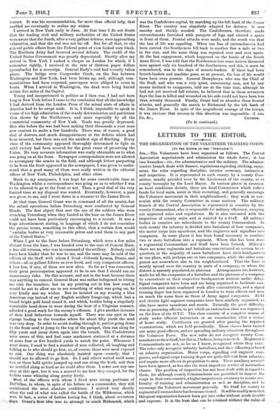CORRESPONDENCE.
REMINISCENCES OF THE AMERICAN CIVIL WAR.—I. [TO THE EDITOR OF TEE " SPECTATOR."]
Sra,—It has been represented to me that it might be of interest to some of your readers, both in this country and in the United States, to learn something of the reminiscences of one who, for a short time, was a spectator of the stirring events which occurred in America fifty-two years ago. I may mention that I did not at the time keep any diary or notes of what I saw. I am, therefore, writing entirely from recollection.
In 1864, I was twenty-three years of age, and a subaltern in tho Royal Artillery. I had been employed on the Staff of Sir Henry Storks, the Lord High Commissioner of the Ionian Islands. When, in May, 1864, the islands were ceded to Greece, I returned to England. I was aware that in a few months Sir Henry Storks would be sent as Governor to Malta, and that I should be reappointed to serve on his Staff. I was very anxious to see something of the war which was then proceeding in the United States, and, therefore, having obtained leave, I determined to occupy my time during the interval before, proceeding to Malta by a visit to America. I was well aware that it would not be easy to get to the front. At that time the relations between England and the United States were very strained. Although the sympathies of the mass of the people were on the side of the North, those of London society, which found expression in Parliament at that time to a much greater extent than would be the case at present, and which were strongly represented in the London Press, were very decidedly in favour of the Southerners. Moreover, the ' Trent' affair, which at one time threatened to lead to war, the depredations caused by the ' Alabama ' and other ships which had issued from British ports, and the fact that English blockade runners were active in supplying arms and ammunition to the Southerners, caused great irritation in the United States. I was also aware that considerable reluctance was shown by the American military authorities to allow foreign officers to go to the front. As a matter of fact, when I eventually got to the lines before Petersburg, only one foreign officer besides myself was present. He was a French Colonel of Engineers, who was a good deal older than myself, and gave me some very good advice. After I had seen some- thing of the Northern Army, I should rather have liked to visit the other side ; but my more experienced French comrade very wisely pointed out to me that by doing so I should place myself in a very awkward position, as I should, without doubt, be asked questions-- to which it would be my duty not to reply—about what I had seen on tho Federal side. I therefore abandoned the idea. I was furnished with a letter of introduction from the Foreign Office to Lord Lyons, who then represented Great Britain at Washington. But I relied less on this than on my family connexion with America. My cousin, Mr. Thomas Baring, who was then the head of Barings' firm and a strong Conservative, had vigorously defended the cause of the North in Parliament, and had deprecated what ho considered the excessive sympathy shown for the Southern cause. My anticipations proved
correct. It was his recommendation, far more than official help, that enabled me eventually to realize my wishes
I arrived in New York early in June. At that time I do not doubt that the leading civil and military authorities of the United States were aware that the South, after a very gallant defence, were approaching exhaustion, and that the end was not far off. But for all that, to the
gcn3ral public affairs the Federal point of view looked very black. The Northern Army had incurred several defeats. The credit of the United States Government was greatly depreciated. Shortly after my arrival in New York I cashed a cheque on London for which, if I remember rightly, I received at tho rate of thirteen paper dollars (greenbacks) for a sovereign. General Early's raid had recently taken place. The bridge over Gunpowder Creek, on the line between Washington and New York, had been blown up, and, although com- munications had been reopened, passengers were obliged to cross in boats. When I arrived in Washington, the dead were being buried within five miles of the Capitol.
Young and inexperienced in polities as I then was, I had not been long in New York before I came to the conclusion that all the knowledge I had derived from the London Press of the actual state of affairs in America had to be swept aside. It is, I think, impoisible to speak in terms of too high admiration of the sturdy determination and patriotism then shown by the Northerners, and more especially by all the commercial community of New York. Trade was greatly depressed. Men who before the war had been making their thousands a year were now content to make a few hundreds. Thorn was, of course, a good deal of distress, and much disappointment at the defeats which had been incurred, but there was not the smallest sign of flinching. Every class of the community appeared thoroughly determined to fight on until victory had been secured for the great cause of preserving the Union. No very accurate information was really obtainable as to what was going on at the front. Newspaper correspondents were not allowed to accompany the armies in the field, and although letters purporting to bo from the front appeared in the newspapers, I was given to under- stand that a good many of them were really written in the editorial offices of Now York, Philadelphia, and other cities.
Much to my annoyance, I was kept for some considerable time at Washington whilst a correspondence was going on as to whether I was to be allowed to go to the front or not. Thus, a good deal of the very limited time at my disposal was wasted. Eventually, however, a pass was given to me, and I went down in a steamer to the James River.
At that time, General Grant was in command of all the armies, but the actual operations before Petersburg were conducted by General Meade. The first object that met the eye of the soldiers who were attacking Petersburg when they landed at the base on the James River could not have been particularly encouraging to a recruit. It was a huge advertisement stating, in language of which I do not remember the precise terms, something to this effect, that a certain firm would " embalm bodies at very reasonable prices and send them to any part of the United States."
When I got to the lines before Petersburg, which were a few miles distant from the base, I was handed over to the care of General Hunt, a fine old veteran, who was in command of the artillery. Nobody could have been kinder than he was to me, and the same may be said of the officers of the Staff with whom I lived—Colonels Lynam, Duane, and others—all as gallant follows as ever lived, and very competent officers. I fear few, if any, of them are now alive. So far as I was concerned, their great preoccupation appeared to be to see that I should run no unnecessary risks. On this account, and not in the least because there was anything to conceal, General Hunt was rather indisposed to letting me visit the trenches; but on my pointing out to him how crueLit would bo not to allow me to see something of what was going on, he very kindly met my wishes. But he insisted on my wearing a blue American cap instead of my English artillery forage-cap, which had a broad bright gold band round it, and which, besides being a singularly unsuitable head-dress to wear during the beat of a Virginian summer, afforded a good mark for the enemy's riflemen. I give another instance of their kind behaviour towards myself. There was one spot in the zigzags leading to the trenches where for about fifty yards the mud was very deep. In order to avoid wading through it, parties going down to the front used to jump to the top of the parapet, then run along for fifty yards and jump down again into the trench. The. Confederates wore aware of this, and had some marksmen stationed at a distance of some four or five hundred yards to watch the point. Whenever I went down, I used to find a number of men collected, all laughing and talking as to who should go first, as, of course, these were most exposed to risk. One thing was absolutely insisted upon—namely, that I should not be allowed to go first. So I and others waited until some two or three bold spirits jumped up and ran along the bank, and then we scuttled along as hard as we could after them. I never saw any one shot at this spot, but it was a marvel to me how they escaped, for the bullets came whizzing along pretty freely.
Most of the officers with whom I lived were strong partisans of McClellan, in whom, in spite of his failure as a commander, they still maintained the nrost absolute confidence. I arrived very shortly after the end of what was called the battle of the Wilderness, which was, in fact, a series of battles lasting for, I think, about seventeen dart. Grant's- first idea was to attempt to reach Richmond, which.
was the Confederate capital, by marching up the left bank of the James River. The country was singularly adapted for defence. It was marshy and thickly wooded. The Confederates, therefore, made entrenchments furnished with parapets of logs and cleared a space in front of them. Frontal attacks were made, and the result was that the loss of life was appalling. When one line of entrenchments hitd been carried the Southerners fell back to another line a mile or two in the rear, and the same thing was repeated over and over again. At the last engagement, which happened on the banks of the South Anna River, I was told that the Northerners lost some sixteen thousand men against only six hundred of the Southerners, and this, it must be remembered, was in the days of muzzle-loaders. If there had been breech-loaders and machine guns, as at present, the loss of life would have been even greater. .General Humphreys, who was the Chief of the Staff, and who was a very quiet, unassuming man, not by any means inclined to exaggerate, told me at the time that, although he had not yet received full returns, he believed that in those seventeen days the loss in killed and wounded on his aide could not have been less than seventy thousand. Finally, Grant had to abandon these frontal attacks, and generally the march to Richmond by the left bank of the James River. In spite of the magnificent courage of the troops, it was obvious that success in this direction was imposaible.—I am, Sir, dco., Camas.
(To be continued.)



































 Previous page
Previous page